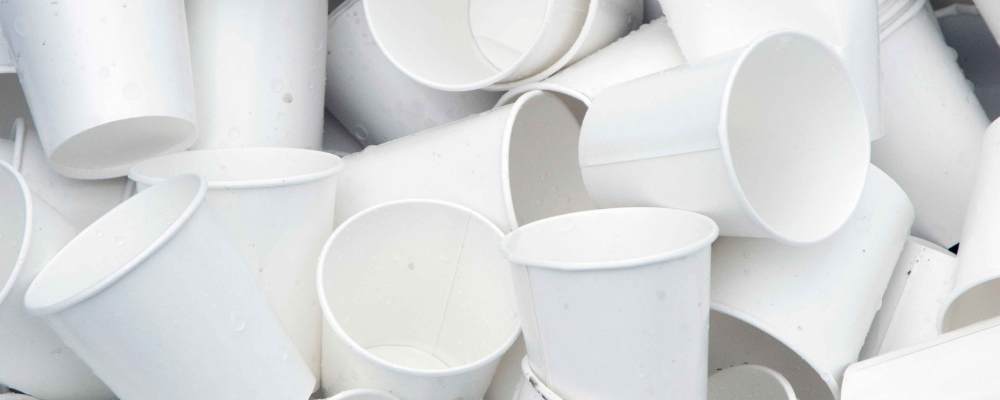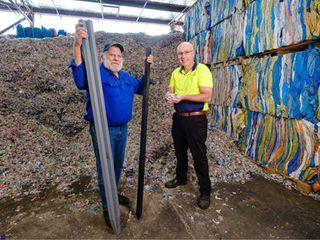Home compostable vs. industrial compostable
The term compostable is used quite often, however it is often used incorrectly. There are two types of compostable products, home compostable and industrial compostable (also known as commercial compostable). Knowing the difference between home compostable and commercial/industrial compostable will give you, and your customers the power to make an environmental impact.
Let's take a step back: What is compostable?
Compostable is a term that refers to a products ability to decompose into a nutrient-rich material called humus, which is used as a source of nutrients for plants.
To compost a compostable product, the compostable product needs to have the right conditions to turn into humus.
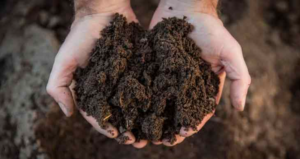
Microorganisms, ideal temperatures and moisture levels, oxygen levels and nutrient ratios are all key in producing humus from a compostable product. Without the ideal environment i.e. poor moisture levels or inadequate oxygen levels, compostable products will emit methane.
- Microorganisms: Microorganisms are usually found in soil. Arguably the most important feature of composting, microorganisms eat the compostable material and produce humus.
- Ideal temperatures: Ideal temperatures are required to provide healthy and optimal environments for microbial activity (microorganisms eating the compostable material).
- Ideal moisture levels: Similar to ideal temperatures, moisture levels provide healthy and optimal environments for microbial activity.
- Oxygen levels: Microorganisms produce humus through aerobic respiration. Aerobic respiration requires oxygen.
- Nutrient ratios: Carbon and nitrogen levels are important in composting as microorganisms react to varying nutrient ratios in their habitat.
What is the difference between home compostable and industrial compostable?
Home compostable
Home compostable refers to a product’s ability to compost in a home composting environment such as worm farm, dug in a hole in the ground and traditional composting. These home composting environments must provide optimal environments for composting to occur such as microorganisms, ideal temperatures, ideal moisture levels, oxygen levels and nutrient ratios.
In Australia and New Zealand, most food organics and garden organics (FOGO) bins and councils do not accept home compostable products.
The golden standard for home compostable products is certification AS 5810 which means that a product has been tested to prove:
- min. 90% min. biodegradation in 180 days
- 90% disintegration into less than 2mm pieces within 12 weeks
- no toxic effect to compost, plants and earthworms
Industrial compostable
Industrial compostable or commercially compostable refers to a products ability to compost through industrial composting facilities. Industrial composting facilities differ in the composting technology they use to provide optimal environments for composting (microorganisms, temperature, moisture, oxygen and nutrient ratios).
Unfortunately, most industrial compostable products are not composted as:
- Many Australians and New Zealanders do not have access to industrial composting facilities (therefore compostable items generally end up in landfill)
- Council green bins/FOGO bin collections usually do not accept industrial compostable products including coffee cups, mailers and other food packaging
- Due to varying technologies used at industrial composting facilities, not all will accept industrial compostable products
Most compostable products on the market refer to industrial compostable and few are composted correctly. In addition to the reasons above, most users are unaware that industrial compostable products need to be treated a certain way for composting.
The golden standard for industrial compostable products is certification AS 4736 which means that product has been tested to prove:
-
- min. 90% biodegradation in 12 weeks under industrial conditions and
- disintegration after 6 months under industrial conditions
However, despite available certification, the fact still remains that most industrial compostable products are not composted.
What is certified home compostable and industrial compostable?
Certified home compostable AS 5810
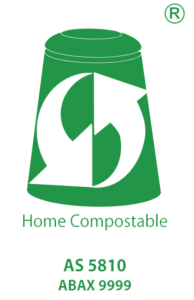
Type: Home compostable certification
Body: Australasian Bioplastics Association (ABA)
Relevant location: Australia and NZ
Testing Requirements: Min 90% biodegradation in 180 days and 90% disintegration into less than 2mm pieces within 12 weeks, no toxic effect to compost, plants and earthworms.
Certified industrial compostable AS 4736
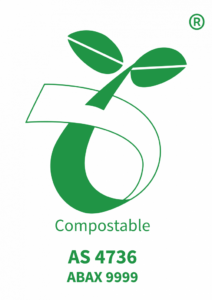
Type: Industrial compostable certification
Body: Australasian Bioplastics Association (ABA)
Relevant location: Australia and NZ
Testing requirements: Min 90% biodegradation in 12 weeks and disintegration after 6 months under industrial conditions
Is home compostable better than industrial compostable?
In Australia and New Zealand, home compostable AS 5810 products are the preferred due to our limited industrial composting facility accessibility. Most Australians and New Zealanders can safely compost certified home compostable products at home.
However, the Australian Packaging Covenant Organisation only recommend compostable alternatives to be used if:
- the compostable product is necessary
- the compostable product does not have the ability to be a reusable item
- the compostable item will be contaminated permanently with food residue unless it is washed
- the compostable product may not be used in a closed system i.e. food outlets where food is likely to leave the premises, festivals, outdoor events, etc.
There are few alternative soft plastic recycling programs available to Australians and New Zealanders as of January 2023. It is recommended to avoid soft plastics as much as possible, and only choosing home compostable if you or your customers have the intention and education to compost at home.
What to do if you have an industrial compostable product
- Avoid disposing of it in landfill as this will omit methane and contribute to our climate crisis
- Reuse as much as possible
- If you have a FOGO, check if they accept Industrial Compostable products, try and list the certification number to your council
- Ask the supplier if they have an industrial composting facility you can return the product to
- Keep a collection and take them to an accepting industrial composting facility when you have access to one
Resources
APCO – Considerations for Compostable Packaging
APCO – National Compostable Packaging Strategy
Compostable Alternatives – Home Compostable Certifications
The packaging ranges previously sold by Closed Loop, plus much more, can now be sourced through PAC Trading. Contact PAC via email at dispatch@pactrading.com.au or their website https://www.pactrading.com.au.




